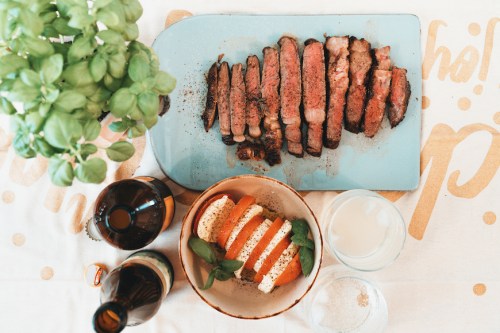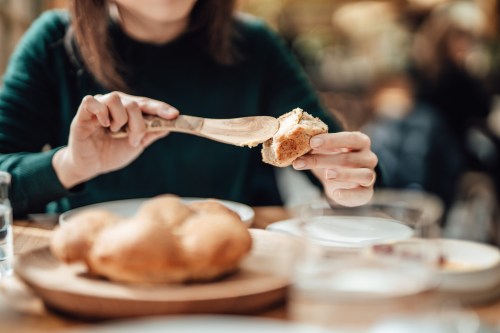Our editors independently select these products. Making a purchase through our links may earn Well+Good a commission
A New Eating Style Encourages People To ‘Eat Like the Animals’—And It’ll Change What You Think About Protein
A new book, Eat Like The Animals, highlights the science behind how animals eat and what humans can learn from it. Plus, a dietitian weighs in.

In many ways, the food world has evolved for the better. (I don’t even want to remember life before oat milk lattes and sweet potato tater tots.) But no one is really going to argue with the fact that, in many ways, the way humans have evolved to eat over time has gotten worse. In fact, the Paleo diet was founded on this belief. But a new eating style is take it a step further. Instead of guidelines based on eating habits of the earliest humans, David Raubenheimer, PhD, and Stephen Simpson are encouraging people to consider what other species consume with their new book, Eat Like the Animals: What Nature Teaches Us About Healthy Eating. From insects to gorillas, humans can learn a lot about the science of healthy eating by observing animals.
Experts in This Article
David Raubenheimer, PhD is a a science professor at the University of Sydney and co-author of the book, Eat Like The Animals.
registered dietitian and author of The Better Period Food Solution.
registered dietitian and CEO and co-founder of Culina Health
Dr. Raubenheimer, a science professor at the University of Sydney, says the big lesson we can learn from animals is not what they eat, but how they eat. “We discovered that insects have several appetites, each for a different nutrient,” he says. “In the right food environments, healthy food environments, these work together to ensure the animal selects a balanced diet.”
The authors of Eat Like the Animals applied this exact line of thinking when analyzing human nutrition. “We found that, like insect, humans use specific appetites to select a balanced diet, too” says Dr. Raubenheimer. “We also found that of these appetites, the appetite for protein is stronger than the appetites for fats and carbohydrates, and this fact is important for understanding obesity.”
What it means to ‘eat like the animals’
After studying 40 different animals species, Dr. Raubenheimer and Simpson found that eating like an animal means eating a specific balance of nutrients based on evolved needs. “Predators like cats and wolves select a diet high in protein, up to 50 percent of energy. Some herbivores—many primates in the wild, for example—select a diet that is lower in protein, typically 10 to 20 percent of energy,” Dr. Raubenheimer says.
Dr. Raubenheimer and Simpson found that animals crave protein more than fats and carbs, and when they ate fats and carbs instead of protein, they tended to overeat them because they needed to eat more fats and carbs to reach the same energy level that a more moderate amount of protein would provide, and that made them more likely to develop animal obesity.
Dr. Raubenheimer says a protein goal of 10 to 20 percent is enough for humans. But what should the rest of your plate look like? “Fiber fills the gut and acts as a ‘brake’ on appetites,” says Dr. Raubenheimer. Without fiber, animals and people alike tend to overeat protein. Healthy fats and unprocessed carbohydrates play important roles in animal and human diets as well, says Dr. Raubenheimer. But the key is to prioritize protein and fiber first.
Is ‘eating like the animals’ right for you?
Vanessa Rissetto, RD, says she can see the logic behind the premise of Eating Like The Animals. While she doesn’t see anything “wrong” with this way of eating, she does warn against any eating plan that says it’s the best one for everyone.
“Different people have different nutrient needs,” she says. “There isn’t a ‘right’ balance that works for everyone.” In humans, age and activity affect how much protein, fiber, carbohydrates, and healthy fats one needs. “Another reason why animals in the wild may prioritize protein is that they might not know when they’re getting their next meal,” she says.
Another big difference between animals and humans, says Rissetoo, is that humans don’t just eat for energy; humans eat for pleasure, as a way to connect to others, and sometimes that means having a big bowl of pasta followed by a piece of chocolate cake. And that’s fine.
There is a lot we can learn from animals—especially when it comes down to the best way to eat for energy, prioritizing protein over carbs and healthy fats. But it’s certainly not the only healthy way to eat.
Here’s what you need to know about intuitive eating:
Sign Up for Our Daily Newsletter
Get all the latest in wellness, trends, food, fitness, beauty, and more delivered right to your inbox.
Got it, you've been added to our email list.










